(完整版)小升初英语语法-连词
小升初英语语法知识点大全
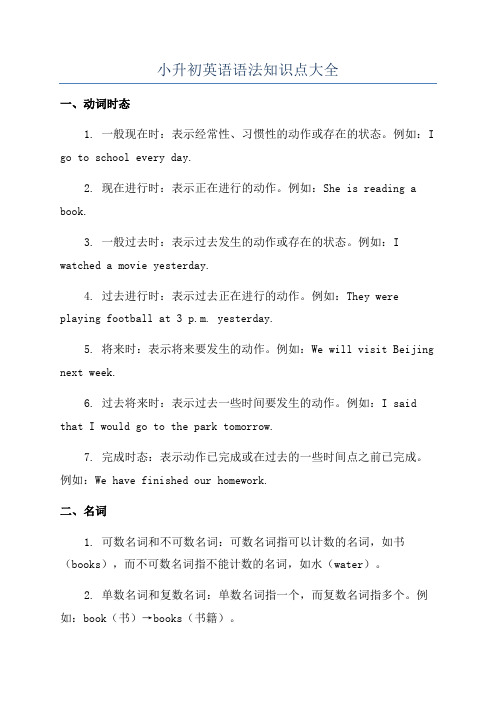
小升初英语语法知识点大全一、动词时态1. 一般现在时:表示经常性、习惯性的动作或存在的状态。
例如:I go to school every day.2. 现在进行时:表示正在进行的动作。
例如:She is reading a book.3. 一般过去时:表示过去发生的动作或存在的状态。
例如:I watched a movie yesterday.4. 过去进行时:表示过去正在进行的动作。
例如:They were playing football at 3 p.m. yesterday.5. 将来时:表示将来要发生的动作。
例如:We will visit Beijing next week.6. 过去将来时:表示过去一些时间要发生的动作。
例如:I said that I would go to the park tomorrow.7. 完成时态:表示动作已完成或在过去的一些时间点之前已完成。
例如:We have finished our homework.二、名词1. 可数名词和不可数名词:可数名词指可以计数的名词,如书(books),而不可数名词指不能计数的名词,如水(water)。
2. 单数名词和复数名词:单数名词指一个,而复数名词指多个。
例如:book(书)→books(书籍)。
3. 可数名词的复数形式:许多词在复数时需进行变位,如cat(猫)→cats(猫)、baby(婴儿)→babies(婴儿)。
4. 不可数名词的用法与数量表示:不可数名词无复数形式,不能与数词或a/an连用。
对于不可数名词表示的量,需使用量词或具体表示数量的词语,如a bottle of water、a cup of tea。
三、形容词和副词1. 形容词用法:形容词修饰名词,用来描述名词的性质或特征。
例如:a big dog(一只大狗)。
2. 形容词的比较级和最高级:形容词的比较级用于表示两个人或物之间的比较,如taller(更高),而最高级则用于表示三个或三个以上人或物之间的比较,如the tallest(最高的)。
小升初英语专题复习(语法专练)连词

小升初英语专题复习(语法专练):连词一、单选题(共50题)1.— Why are you wearing a raincoat?— _________ it's going to rain.A. SoB. BecauseC. Though2.She is having dinner, _______ the phone rings.A. onB. butC. so3.People don't travel by car______ by bike.A. orB. andC. but4._______ Bill and his father visit his grandparents, he still plays computer games.A. WhatB. WhereC. When5.We can't do so many things in the library. We can't talk ________ run.A. andB. butC. or6.Steven is a naughty ________ clever boy. He helped me a lot.A. andB. butC. then7.We can't eat ________ drink in class. We should listen carefully.A. andB. soC. or8.I'm going to the park, ________ it is getting dark now.A. butB. thenC. and9.He is playing the piano ________ everyone is listening and clapping.A. andB. orC. but10.My ruler is 15cm. Your ruler is 20cm. Your ruler is longer mine.A. thanB. thatC. what11.She always speaks _________smiles.A. withB. andC. or12.What kind of fruit would you like, watermelons _______grapes?A. orB. andC. with13.The film is so boring, ________ I don't want to see it.A. butB. becauseC. so14.—Why do you like the film?— ________ it's very relaxing.A. BecauseB. SoC. For15.The skirt is very cheap, ________ I'm going to buy it.A. butB. andC. so16.English is very difficult for me, _________ interesting.A. butB. andC. or17.Let's go to the shop ________ buy some clothes.A. andB. butC. or18.I visited some cities,_______ Shanghai, Hangzhou and Beijing.A. andB. such asC. so19.What do you do you have the flu?A. andB. whenC. where20._____ it was very hot in Thailand, we had a great time there.A. BecauseB. AlthoughC. So21.They look ____________.A. healthy and youngB. health and strongC. health and young22.I usually go to the park and_________ a kite.A. flewB. flyC. flies23.Hong Kong is a modern city, _______ it is a great place to go shopping.A. butB. ifC. and24.Please call me _________ you get to Beijing.A. orB. whenC. because25.I was really sad _________ I lost my dog.A. soB. andC. because26.Which city do you like, New York _________ Rome?A. orB. andC. but27.Janet was late for school ________ she got up late.A. soB. ifC. because28.I've got a cat, _______ I don't like it.A. soB. butC. or29.There are many differences _______ this book _______ that book.A. between; inB. between; andC. between; of30.He likes to hear _______ not to say.A. orB. andC. but31.Mike sister is tall _____________ thin.A. withB. thanC. and32.My dog is bigger _____________ yours.A. withB. toC. than33.He likes music, _______ he can't sing well.A. butB. andC. so34.Every day, she sat at a coffee shop writing ______ the first book was finished.A. toB. untilC. but35.The man is poor, he feels happy.A. andB. orC. but36.—I want to see the film. It's interesting.—________ I am hungry now. I want to eat first.A. AndB. SoC. But37.—How can I get to the bookstore?—Go Straight .______turn right.A. ButB. SoC. Then38.Tom visited the farm ___ his family yesterday.A. withB. forC. and39.They are working on the farm,________it starts to rain.A. andB. butC. or40.I also work hard all day, _____ people never praise me.A. andB. orC. but41.I was very tired, very happy.A. andB. butC. or42.Winter is cold in many countries, these smart animals can spend it safely.A. butB. andC. or43.Mr. and Mrs. White are poor, ________ they are very happy.A. andB. soC. but44.I like water, I can't swim.A. andB. butC. or45."It's easy fun," said Anne.A. thenB. butC. and46.Tom is taller me.A. thanB. moreC. more than47.Which pen do you like, the white one the black one?A. orB. andC. but48.The city is modern __________ noisy now.A. andB. butC. to49.I had a race _______ John and Max.A. withB. orC. and50.I couldn't play football ________ swim well.A. orB. andC. with答案解析部分一、单选题1. B解:句意:—你为什么穿雨衣?—……要下雨了。
小学英语语法--连词
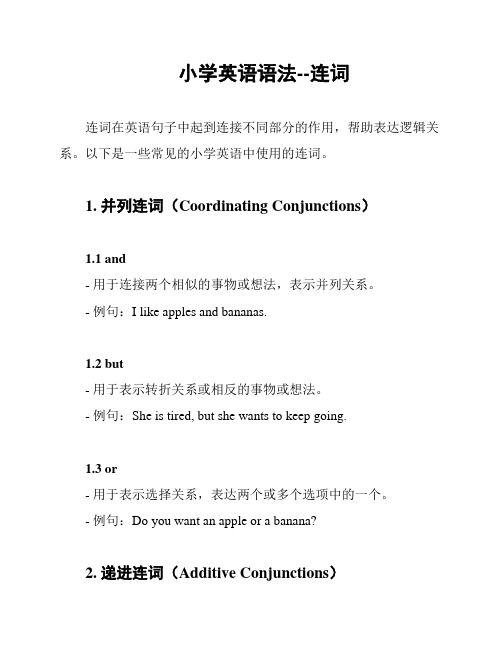
小学英语语法--连词连词在英语句子中起到连接不同部分的作用,帮助表达逻辑关系。
以下是一些常见的小学英语中使用的连词。
1. 并列连词(Coordinating Conjunctions)1.1 and- 用于连接两个相似的事物或想法,表示并列关系。
- 例句:I like apples and bananas.1.2 but- 用于表示转折关系或相反的事物或想法。
- 例句:She is tired, but she wants to keep going.1.3 or- 用于表示选择关系,表达两个或多个选项中的一个。
- 例句:Do you want an apple or a banana?2. 递进连词(Additive Conjunctions)2.1 also- 用于添加类似的事物或想法。
- 例句:She speaks English, and she also speaks French.2.2 furthermore- 用于提供更多信息或进一步解释。
- 例句:He is good at math. Furthermore, he excels in science.3. 转折连词(Concessive Conjunctions)3.1 although- 用于表示尽管某个条件存在,但结果与之相反。
- 例句:Although it was raining, we still went outside.3.2 however- 用于表示对前面说法的转折或相反观点。
- 例句:I wanted to go to the concert; however, I couldn't find tickets.4. 原因连词(Causal Conjunctions)4.1 because- 用于表示原因或解释。
- 例句:He couldn't go to the party because he was sick.4.2 so- 用于表达前因后果的关系。
人教版小升初英语复习(专题连词成句)
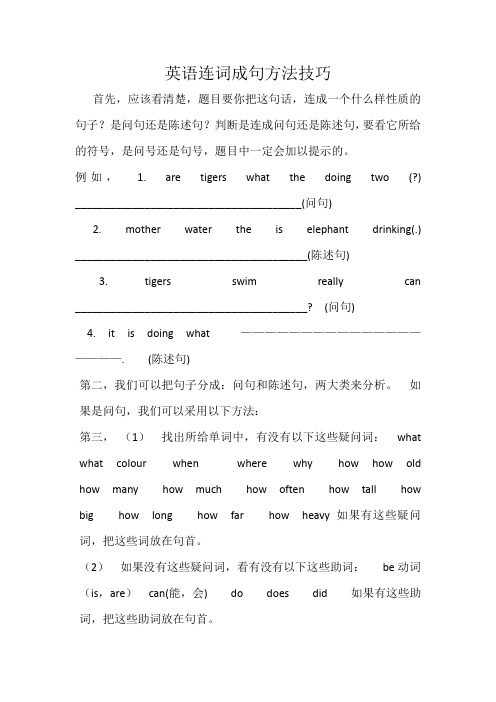
英语连词成句方法技巧首先,应该看清楚,题目要你把这句话,连成一个什么样性质的句子?是问句还是陈述句?判断是连成问句还是陈述句,要看它所给的符号,是问号还是句号,题目中一定会加以提示的。
例如, 1.are tigers what the doing two(?) _______________________________________(问句)2.mother water the is elephant drinking(.) ________________________________________(陈述句)3.tigers swim really can ________________________________________?(问句)4.it is doing what———————————————————.(陈述句)第二,我们可以把句子分成:问句和陈述句,两大类来分析。
如果是问句,我们可以采用以下方法:第三,(1)找出所给单词中,有没有以下这些疑问词:what what colour when where why how how old how many how much how often how tall how big how long how far how heavy如果有这些疑问词,把这些词放在句首。
(2)如果没有这些疑问词,看有没有以下这些助词:be动词(is,are)can(能,会)do does did如果有这些助词,把这些助词放在句首。
(3)完成上面的步骤以后,接下来,找到人称代词(you, he,she,it,we,they)或是名词,把这些词放在助词后。
(4)动词放在其次。
(5)介词短语再其次。
(6)时间地点居最后,地点在前,时间在后。
例如, 1.did you on the weekend do what(?)What did you do on the weekend?第四,如果要求连成陈述句,我们可以采用以下方法:(1)找到人称代词(you,he,she,it,we,they)或着指示代词(this,that,these,those)等,或者名词,把这些词放在句首。
(完整版)小学英语语法-连词
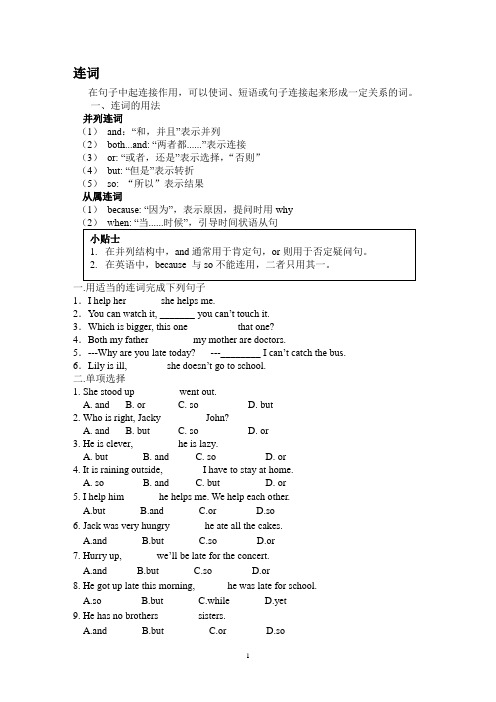
连词在句子中起连接作用,可以使词、短语或句子连接起来形成一定关系的词。
一、连词的用法并列连词(1)and:“和,并且”表示并列(2)both...and: “两者都......”表示连接(3)or: “或者,还是”表示选择,“否则”(4)but: “但是”表示转折(5)so: “所以”表示结果从属连词(1)because: “因为”,表示原因,提问时用why一.用适当的连词完成下列句子1.I help her ______ she helps me.2.You can watch it, _______ you can’t touch it.3.Which is bigger, this one _________ that one?4.Both my father ________ my mother are doctors.5.---Why are you late today? ---________ I can’t catch the bus.6.Lily is ill, _______ she doesn’t go to school.二.单项选择1. She stood up ________ went out.A. andB. orC. soD. but2. Who is right, Jacky ________ John?A. andB. butC. soD. or3. He is clever, ________ he is lazy.A. butB. andC. soD. or4. It is raining outside, _______ I have to stay at home.A. soB. andC. butD. or5. I help him ______ he helps me. We help each other.A.butB.andC.orD.so6. Jack was very hungry ______ he ate all the cakes.A.andB.butC.soD.or7. Hurry up, ______ we’ll be late for the concert.A.andB.butC.soD.or8. He got up late this morning, ______he was late for school.A.soB.butC.whileD.yet9. He has no brothers _______ sisters.A.andB.butC.orD.so1。
2022-2023学年度小升初英语总复习-连词成句(辽师大版一起)
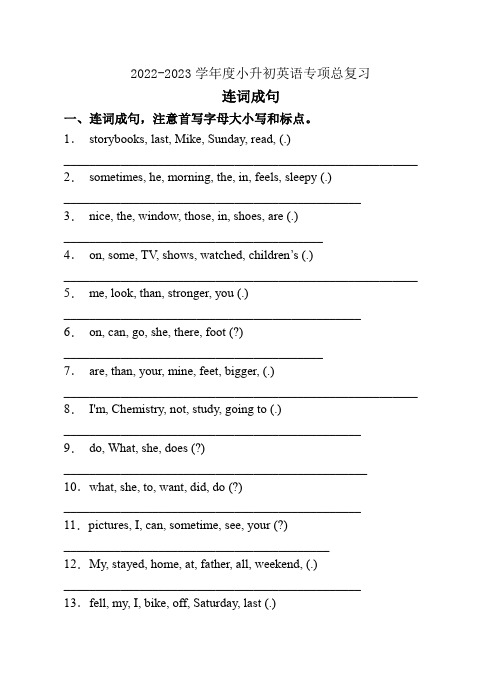
2022-2023学年度小升初英语专项总复习连词成句一、连词成句,注意首写字母大小写和标点。
1.storybooks, last, Mike, Sunday, read, (.)________________________________________________________ 2.sometimes, he, morning, the, in, feels, sleepy (.)_______________________________________________ 3.nice, the, window, those, in, shoes, are (.)_________________________________________4.on, some, TV, shows, watched, children’s (.)________________________________________________________ 5.me, look, than, stronger, you (.)_______________________________________________6.on, can, go, she, there, foot (?)_________________________________________7.are, than, your, mine, feet, bigger, (.)________________________________________________________ 8.I'm, Chemistry, not, study, going to (.)_______________________________________________9.do, What, she, does (?)________________________________________________ 10.what, she, to, want, did, do (?)_______________________________________________ 11.pictures, I, can, sometime, see, your (?)__________________________________________12.My, stayed, home, at, father, all, weekend, (.)_______________________________________________ 13.fell, my, I, bike, off, Saturday, last (.)14.plastic, made, of, is, the, chair (.)_______________________________________________ 15.His, animal, the turtle, favourite, is (.)__________________________________________ 16.You,would,the,come,party,to (?)_______________________________________________ 17.having,I,a,am,party,birthday (.)_______________________________________________ 18.There, a, forest, is, my, in, village (.)_________________________________________ 19.mine, are, bigger, than, your, feet (.)__________________________________________ 20.can, stand, you, on, foot, one, (?)_________________________________________ 21.surprise, want, buy, for, I, to, a, Jenny, (.)_______________________________________________ 22.go, How, he, to, did, Turpan (?)__________________________________________ 23.hit, to, can, you, the, ball, Jenny (?)_______________________________________________ 24.usually, play football, I, after school (.)_________________________________________ 25.luck, for, good, future, the (!)_______________________________________________ 26.do, How, you, that, know (?)__________________________________________ 27.temperature, is, your, what (?)28.a, few, in, spring, have, We, fun, things (.)_______________________________________________ 29.your, was, weekend, how (?)_______________________________________________ 30.he, monkey, think, I, little, is, 40cm, only, tall (.)_______________________________________________ 31.man, we, old, meet, an(.)_______________________________________________ 32.bad, your, It’s, eyes, for (.)________________________________________________ 33.no, in, there, my, old, was, library, school (.)________________________________________________________ 34.you, be, Chinese, my, pen friend, Can (?)_________________________________________35.to, are, what, buy, they, going, (?)_________________________________________36.all, are, short, or, you (?)_______________________________________________ 37.see, Did, a, you, last, film, weekend (?)_______________________________________________ 38.hard, at, I, sports, work (.)_______________________________________________ 39.aller, who, is, May, than, (?)_______________________________________________ 40.are, There, balloons, many (.)_______________________________________________ 41.drink, its, elephants, to, can, the, nose, use (?)42.be, sale, There, a, our, will, school, in (.)________________________________________________ 43.eat, often, vegetables, does, how, she (?)_______________________________________________ 44.going, draw, We, to, are, pictures, some (.)__________________________________________ 45.are, they, trees, climbing (.)_______________________________________________ 46.pandas, see, can, You, there, go, to, (.)_________________________________________ 47.tomorrow, It, sunny, will, be, cool, and (.)_______________________________________ 48.We’ll, Great Wall, to, the, go (.)_______________________________________________ 49.some, interesting, are, stories, more (.)_______________________________________________ 50.on, time, always, I, school, to, go (.)_______________________________________________ 51.he, Li Ming, door, opens (.)_______________________________________________ 52.Sara, Why, does, look, so, worried (?)_______________________________________________ 53.me, tell, your, school, about, please ( . )_______________________________________________ 54.we, travel, shall, world, around, the, (?)________________________________________________ 55.you, boy, are, a, good (!)56.your, how, is, brother, heavy (?)_______________________________________________ 57.beautiful, world, how, the, was (!)__________________________________________ 58.else, anything, do, you, Did (?)__________________________________________ 59.on, There, the, a, clock, table, is (.)_________________________________________ 60.do, what, breakfast, you, time, have (?)__________________________________________ 61.for, you, is, here, flower, a (.)_________________________________________ 62.want, those, you, or, do, these (?)_________________________________________ 63.you, would, some, milk, like (?)________________________________________________ 64.How, your, was, weekend (?)_______________________________________________ 65.kind, like, noodles, What, would, of, you, (?)________________________________________________ 66.watched, yesterday, TV, he, afternoon(.)_______________________________________________ 67.she, Does, in, China, live (?)__________________________________________ 68.he, what, sport, did, in, take, part (?)________________________________________________ 69.is, China, flying, He, now, to, (.)70.are, How, you, heavy(?)___________________________________________ 71.works, school, at, hard, Kim, (.)_______________________________________________ 72.should, go to work, We, on foot, today (.)_________________________________________ 73.number, phone, your, is, what, (?)_________________________________________ 74.you, years, where, ten, did, ago, live (?)_______________________________________________ 75.couldn’t,my,bike,ride,I(.)_______________________________________________ 76.here, because, lion, a, is (.)_______________________________________________ 77.lots, space, about, have, I, books, of, comic (.)__________________________________________ 78.kids, of, afraid, are, monster, the (.)_______________________________________________ 79.jumped, brother, the, lake, my, into (.)_______________________________________________ 80.else, did, I, yesterday, something (.)_______________________________________________(参考答案)一、连词成句,注意首写字母大小写和标点。
小升初英语语法专项练习-【连词】全国通用(含答案及详细解析)
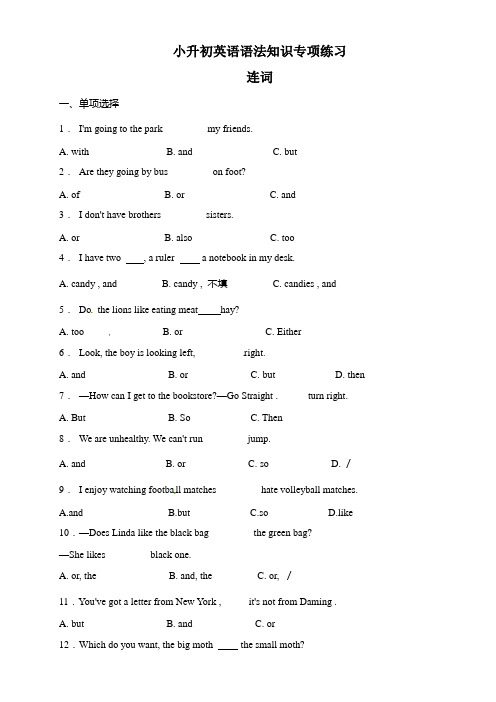
小升初英语语法知识专项练习连词一、单项选择1.I'm going to the park ________ my friends.A. withB. andC. but2.Are they going by bus ________ on foot?A. ofB. orC. and3.I don't have brothers ________ sisters.A. orB. alsoC. too4.I have two , a ruler a notebook in my desk.A. candy , andB. candy , 不填C. candies , and 5.Do the lions like eating meat hay?A. tooB. orC. Either6.Look, the boy is looking left, ________ right.A. andB. orC. butD. then 7.—How can I get to the bookstore?—Go Straight .______turn right. A. But B. So C. Then8.We are unhealthy. We can't run ________ jump.A. andB. orC. soD. /9.I enjoy watching footba ll matches ________ hate volleyball matches.A.andB.butC.soD.like 10.—Does Linda like the black bag ________ the green bag?—She likes ________ black one.A. or, theB. and, theC. or, /11.You've got a letter from New York , _____it's not from Daming .A. butB. andC. or12.Which do you want, the big moth the small moth?A. andB. orC. /13.Tom visited the farm ___ his family yesterday.A. withB. forC. and14.Do you go to bed at 9 at 9:30 in the evening?A. andB. orC. but15.You're taller ______ your brother.A. thanB. andC. more16.I like ice cream, ________ it's sweet.A. andB. butC. because17.The nature park is __________ beautiful.A. becauseB. soC. but18.I like the room, ________ it is not big or bright.A.becauseB.soC.but19.Miss Li is busy ________ she still helps u s a lot.A. butB. andC. orD. so 20.I don't like winter it's too cold.A. andB. becauseC. so21.I like chilies ________ they are spicy.A. butB. becauseC. soD. and 22.Mike is tall__________ strong.A. andB. orC. but23.—________ doesn't Alice go to school?—________ she is ill.A.Why, BecauseB.Because, WhyC.How, Yes24.My mother can drive a car, she can ride a bike, too.A. andB. butC. or25.I like noodles _____ I don't like rice.A. haveB. orC. but26.There aren't any trees ________ flowers in the garden.A. orB. andC. soD. but27.—I want to see the film. It's interesting.—________ I am hungry now. I want to eat first.A. AndB. SoC. But28.________ hat do you like, the brown one ________ the black one?A. Which, andB. What, orC. Which, or29.I don't live in China, __________ I like Chinese.A.andB.butC.so30.I like eating ice cream, _______I eat a little at a time.A. soB. orC. but(参考答案)一、单项选择1.【答案】A【解析】句意:我打算......我的朋友们去公园。
小学英语语法-连词

小学英语语法-连词连词是连接两个句子或词语的词汇,它能够帮助我们更加准确和流畅地表达我们的意思。
下面是一些小学英语中常见的连词及其用法。
并列连词(Coordinating Conjunctions)并列连词用于连接相同类型的词语、词组或句子。
常见的并列连词有以下几种:- and:用于连接相似、相同或并列的词语或句子。
例如:Tom likes apples and bananas.and:用于连接相似、相同或并列的词语或句子。
例如:Tom likes apples and bananas.- but:用于表示相对或相反的情况。
例如:She is tired, but she wants to keep playing.but:用于表示相对或相反的情况。
例如:She is tired, but she wants to keep playing.- or:用于提供选择或对比的情况。
例如:Do you want tea or coffee?or:用于提供选择或对比的情况。
例如:Do you want tea or coffee?从属连词(Subordinating Conjunctions)从属连词用于连接主从复合句。
它们引导从句(subordinate clause)并指示从句与主句之间的关系。
常见的从属连词有以下几种:- if:表示条件。
例如:I will go to the park if it's not raining.if:表示条件。
例如:I will go to the park if it's not raining.- when:表示时间。
例如:I will call you when I arrive at the station.when:表示时间。
例如:I will call you when I arrive at the station.连接副词(Conjunctive Adverbs)连接副词是用来连接两个句子或句子的部分,并指示它们之间的关系。
小升初英语写作常用连接词

小升初英语写作常用连接词小升初英语写作常用连接词有哪些呢,大家不妨来看看吧,希望对大家有帮助!1.表文章构造顺序:First of all, Firstly/First,Secondly/Second…And then, Finally, In the end,At last2.表并列补充关系的:What is more, Besides,Moreover,3.表转折比照关系的:However, On the contrary, butOn one hand… On the otherhand…Some…,while others…4.表因果关系的:Because, As、So, Therefore, As a result5.表换一种方式表达:In other words6.表进展举例说明:For example,句子;For instance,句子;such as + n/doing7.表陈述事实:In fact8.表达自己观点:As far as I know, In myopinion9.表总结:In short, In a word.文中正确使用两三个好的句型,如:感慨句、宾语从句、动名词做主语等。
宾语从句举例:I believe Tianjin will be morebeautiful and prosperous.感慨句举例:How I want to study in thebest middle school in Guangzhou!动名词做主语举例:Reading books and swimming aremy hobbies.常用状语从句句型:1)时间:when,not…until(直到…才…), as soon as(一…就…)2)目的:so that + clause; (为了)3)结果:so…that…(如此…以至于…),too…to do(太……以至于……)4)条件:if, unless(除非), as long as(只要)5)比拟:as…as…(与…一样),not so…as…, than。
专题6.连词(小初考点差异及衔接)(原卷版)-2023年小升初英语精品衔接资料 师学科网资料】

连词(小初考点差异及连接)【学校连词考点聚焦】一.用or, and, but, so, because 完成句子。
1. Nick was very tired ________ he was very happy.2. His father never smokes ________ drinks.3. He is ill, he can’t go to school.4. Our classroom is clean ________ tidy.5. Lucy worked hard at English ________ she got first in the English exam.6. People can’t live without air ________ water.7. Hurry up, ________ we will be late.8. We can’t go out now, it is raining outside.9. I like drawing, ________ I don’t like singing.10. I like my mother ________ father.二1. I don’t like pork ________ beef.A. andB. orC. butD. so2. —Would you like to watch TV tonight?— I’d like to, ________ I have to do my homework.A. andB. orC. soD. but3. Put your coat on ________ you will be cold.A. andB. orC. soD. but【学校连词考点聚焦】考点清单考点一并列连词的用法并列连词是用来连接语法地位相同的单词、短语以及句子的连词。
并列连词主要分为表示并列关系、转折关系、因果关系及选择关系的并列连词。
小升初英语形容词、介词、连词

专项五形容词和副词一、形容词1.定义:形容词是用来描述人或事物特征、性质或状态的词,主要修饰名词和代词。
(形容词即中文词意末尾有“的”)2.在句中位置:形容词在动词之后,名词之前。
Eg:These shoes are nice.这双鞋真好看。
He is a clever boy.他是一个聪明的男孩。
二、副词1.副词是用来修饰动词、形容词、副词或全句的词,表示时间、地点、程度、方式等概念。
(副词大部分即中文词意末尾有“地”)2.副词分类:时间副词 eg: yesterday昨天 today今天 now现在 tomorrow明天地点副词 eg: here这里 there那里 outside外面方式副词,即形容词后+ly构成。
Eg: quickly快速地 quietly安静地程度副词 eg: very很,非常 quite十分 too太 only仅仅3.在句中位置:动词之后,形容词和副词之前,地点、时间、方式副词放在句末。
Eg: The boy jumps high.这男孩跳的很高。
I’m very happy today.我今天很高兴。
My uncle is going to New York tomorrow.我叔叔明天将要去纽约。
三、形容词和副词关系1.有些形容词和副词写法一样。
Eg: high 高的;高地 early早的;早地2.有些形容词+ly可变为副词。
Eg: careful-carefully heavy-heavily四、形容词和副词有3个比较等级:原级、比较级和最高级。
五、形容词、副词的比较级和最高级的用法1.“A + be +形容词比较级 + than + B”意思为“A比B更……”。
如:This tree is taller than that one. 这棵树比那棵树高。
注意:①在含有连词than的比较级中,前后的比较对象必须是同一范畴,即同类事物之间的比较。
2.“比较级 + and + 比较级”或“more and more +原级”表示“越来越……”如:It becomes warmer and warmer when spring comes. 春天来了,天气变得越来越暖和了。
小学英语语法-连词+介词
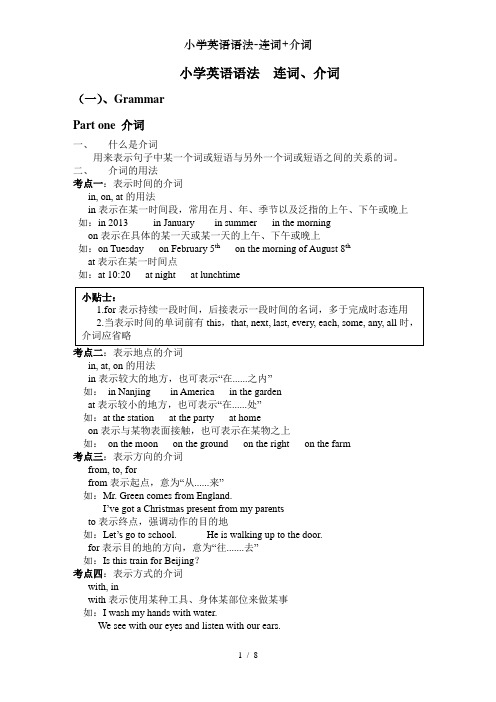
小学英语语法连词、介词(一)、GrammarPart one 介词一、什么是介词用来表示句子中某一个词或短语与另外一个词或短语之间的关系的词。
二、介词的用法考点一:表示时间的介词in, on, at的用法in表示在某一时间段,常用在月、年、季节以及泛指的上午、下午或晚上如:in 2013 in January in summer in the morningon表示在具体的某一天或某一天的上午、下午或晚上如:on Tuesday on February 5th on the morning of August 8that表示在某一时间点如:at 10:20 at night at lunchtime考点二:表示地点的介词in, at, on的用法in表示较大的地方,也可表示“在......之内”如:in Nanjing in America in the gardenat表示较小的地方,也可表示“在......处”如:at the station at the party at homeon表示与某物表面接触,也可表示在某物之上如:on the moon on the ground on the right on the farm考点三:表示方向的介词from, to, forfrom表示起点,意为“从......来”如:Mr. Green comes from England.I’ve got a Christmas present from my parentsto表示终点,强调动作的目的地如:Let’s go to school. He is walking up to the door.for表示目的地的方向,意为“往.......去”如:Is this train for Beijing?考点四:表示方式的介词with, inwith表示使用某种工具、身体某部位来做某事如:I wash my hands with water.We see with our eyes and listen with our ears.in表示使用某种语言如:Can you say it in English?一、填上合适的介词1. There is a supermarket _________ my house.2. Gao Shan is ______ duty today.3. Liu Tao often helps me ________ my study.4. My birthday is ________ October 21.5. There are lots of apples _______ the tree.6. I like reading and I can learn a lot ______ it.7. I can’t find the basketball. Maybe it’s ______ the door.8. I can buy some flowers _______ you.9. I get up ______ seven _______ the morning.10. Jack, please look _______ your things.二、根据中文提示,完成下列句子1. 墙上有许多标志。
小升初复习介词和连词使用

小升初复习介词和连词使用介词和连词是语法中非常重要的一部分,它们在句子中起到连接词语、短语和子句的作用,使句子更加完整和流畅。
对于学生们来说,在小升初的英语考试中,介词和连词的正确使用是获得高分的关键之一。
在本文中,我们将重点介绍介词和连词的基本用法和常见错误,帮助同学们更好地复习和掌握这一知识点。
一. 介词的基本用法介词用来表示事物之间的空间、时间、关系等,常常位于名词或代词前面,起到修饰或连接其他词语的作用。
以下是一些常见的介词及其用法:1. in:表示在某个地方或某个时间内。
例如:in the park(在公园中)、in the morning(在早上)。
2. on:表示在某个表面或某个特定的日期。
例如:on the table(在桌子上)、on Monday(在星期一)。
3. at:表示在某个地点或某个具体的时刻。
例如:at school(在学校)、at 5 o'clock(在5点钟)。
4. for:表示目的、持续时间或代替。
例如:for fun(为了好玩)、for two hours(持续两个小时)、a pen for you(一支给你的笔)。
5. with:表示伴随或具备。
例如:go shopping with friends(和朋友一起去购物)、a girl with blue eyes(一个有蓝眼睛的女孩)。
二. 连词的基本用法连词用来连接词语、短语或者句子,使句子更加连贯。
以下是一些常见的连词及其用法:1. and:表示并列关系,连接相同类型的词语。
例如:apples and oranges(苹果和橙子)、Mike and Mary(迈克和玛丽)。
2. but:表示转折或对立关系,连接相对的内容。
例如:He is smart but lazy(他很聪明,但是懒惰)。
3. or:表示选择关系,连接两个或多个选项。
例如:Do you like apples or bananas?(你喜欢苹果还是香蕉?)4. so:表示因果关系,连接原因和结果。
小升初英语连词知识点归纳

小升初英语连词知识点归纳连词是连接词语、短语和句子的词汇。
在英语中,连词起到连接句子成分、表达逻辑关系和构建复合句的作用。
一、并列连词 (Coordinating Conjunctions)1. and:表示添加、也、还有的意思。
如:I like apples and bananas.(我喜欢苹果和香蕉。
)2. but:表示但是、然而的意思。
如:She is smart, but she is lazy.(她很聪明,但她很懒。
)3. or:表示或者、还是的意思。
如:Do you want tea or coffee?(你要茶还是咖啡?)4. so:表示因此、所以的意思。
如:It was raining so I took an umbrella.(下雨了,所以我带了把伞。
)5. for:表示因为的意思。
如:She got an A for her hard work.(她因为努力工作得到了A。
)6. nor:表示也不的意思。
如:He can neither swim nor ride a bike.(他既不会游泳也不会骑车。
)7. yet:表示然而、但是的意思。
如:She is tired, yet she keeps working.(她很累,但她继续工作。
)8. therefore:表示因此、所以的意思。
如:He was sick, therefore he couldn't come to school.(他生病了,因此不能来上学。
)9. however:表示然而、但是的意思。
如:I want to go with you; however, I haveto work.(我想和你一起去,但是我得工作。
)10. moreover:表示而且、此外的意思。
如:She is talented; moreover, she is very hardworking.(她有才华,而且她非常努力。
小学生英语语法大全连词
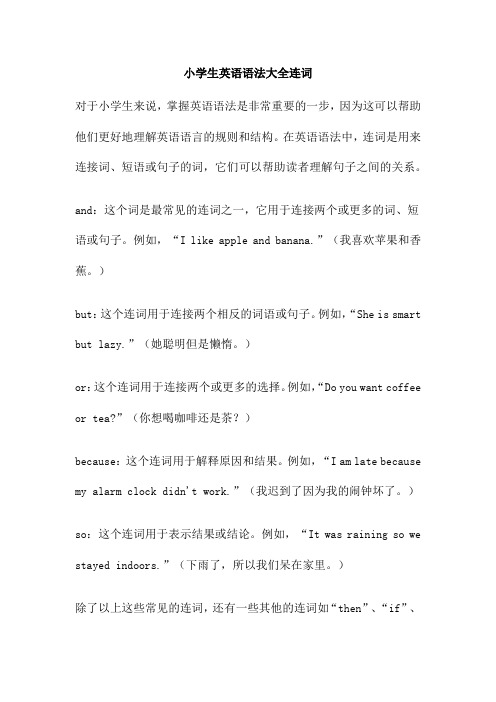
小学生英语语法大全连词对于小学生来说,掌握英语语法是非常重要的一步,因为这可以帮助他们更好地理解英语语言的规则和结构。
在英语语法中,连词是用来连接词、短语或句子的词,它们可以帮助读者理解句子之间的关系。
and:这个词是最常见的连词之一,它用于连接两个或更多的词、短语或句子。
例如,“I like apple and banana.”(我喜欢苹果和香蕉。
)but:这个连词用于连接两个相反的词语或句子。
例如,“She is smart but lazy.”(她聪明但是懒惰。
)or:这个连词用于连接两个或更多的选择。
例如,“Do you want coffee or tea?”(你想喝咖啡还是茶?)because:这个连词用于解释原因和结果。
例如,“I am late because my alarm clock didn't work.”(我迟到了因为我的闹钟坏了。
)so:这个连词用于表示结果或结论。
例如,“It was raining so we stayed indoors.”(下雨了,所以我们呆在家里。
)除了以上这些常见的连词,还有一些其他的连词如“then”、“if”、“when”、“where”等等。
这些连词都是非常有用的,可以帮助读者更好地理解英语句子和文章。
在学习英语语法时,小学生应该学会识别和使用这些连词。
他们可以通过阅读课文、练习册和写作来练习使用这些连词。
家长和老师也可以通过解释和示范来帮助他们更好地理解这些连词的作用和用法。
名词:表示人或事物的名称。
例如:book(书)、class(班级)、teacher(老师)。
动词:表示动作或状态。
例如:run(跑)、love(爱)、study(学习)。
形容词:用来描述名词或代词的性质或状态。
例如:happy(高兴的)、beautiful(美丽的)。
副词:用来描述动词、形容词或其他副词的程度或方式。
例如:quickly (快速地)、very(非常)、happily(快乐地)。
英语语法——连词
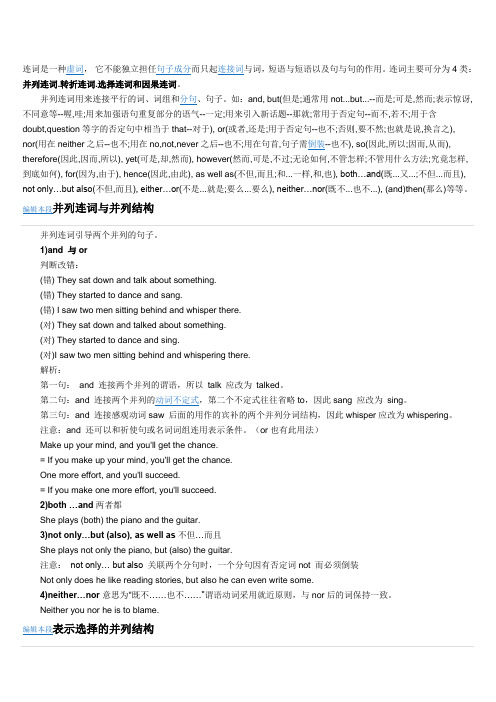
连词是一种虚词,它不能独立担任句子成分而只起连接词与词,短语与短语以及句与句的作用。
连词主要可分为4类:并列连词.转折连词.选择连词和因果连词。
并列连词用来连接平行的词、词组和分句、句子。
如:and, but(但是;通常用not...but...--而是;可是,然而;表示惊讶,不同意等--喔,哇;用来加强语句重复部分的语气--一定;用来引入新话题--那就;常用于否定句--而不,若不;用于含doubt,question等字的否定句中相当于that--对于), or(或者,还是;用于否定句--也不;否则,要不然;也就是说,换言之),nor(用在neither之后--也不;用在no,not,never之后--也不;用在句首,句子需倒装--也不), so(因此,所以;因而,从而), therefore(因此,因而,所以), yet(可是,却,然而), however(然而,可是,不过;无论如何,不管怎样;不管用什么方法;究竟怎样,到底如何), for(因为,由于), hence(因此,由此), as well as(不但,而且;和...一样,和,也), both…and(既...又...;不但...而且), not only…but also(不但,而且), either…or(不是...就是;要么...要么), neither…nor(既不...也不...), (and)then(那么)等等。
编辑本段并列连词与并列结构并列连词引导两个并列的句子。
1)and 与or判断改错:(错) They sat down and talk about something.(错) They started to dance and sang.(错) I saw two men sitting behind and whisper there.(对) They sat down and talked about something.(对) They started to dance and sing.(对)I saw two men sitting behind and whispering there.解析:第一句:and 连接两个并列的谓语,所以talk 应改为talked。
- 1、下载文档前请自行甄别文档内容的完整性,平台不提供额外的编辑、内容补充、找答案等附加服务。
- 2、"仅部分预览"的文档,不可在线预览部分如存在完整性等问题,可反馈申请退款(可完整预览的文档不适用该条件!)。
- 3、如文档侵犯您的权益,请联系客服反馈,我们会尽快为您处理(人工客服工作时间:9:00-18:30)。
九、连接词1、连词的含义:连接词与词、短语与短语、或引导从句的词叫连接词,它是虚词,所以不能单独担任句子成分。
2、连词的分类:连词分为并列连接词和从属连接词两种。
1)并列连接词连接并列的词、短语、从句或句子。
常见的并列连接词有:and(和), but(但是), or(或者,否则), nor(也不), so(所以), however(然而,无论如何), for(因为), still(可是), as well as(也),both..and...(...和...), not only ...but also...(不但…而且…), either… or…(或…或…), neither… nor…(既不…也不…) 等。
2)从属连接词用于引导从句, 常见的从属连接词有:when(当…时候), while(正当…时候),after(在…之后), before(在…之前), since(自从), until(直到), although/though(虽然), if(假如),as(如…一样;由于), as …as…(和…一样), as far as(就…而言), as long as(只要), as soon as(一…就…), even if(即使), because(因为), unless (除非), than(比…), whether (是否…), in orderthat…(为了), so…that…(如此…以致), so that…(以便), now that…(现在既然), by the time…(到…时候), every time…(每当), as if…(仿佛),no matter when(或whenever)(无论何时),no matterwhere(或wherever)(无论在哪里)等。
3、常用并列连词用法1) “and”1. He got up and left the room.2. He went to Kunming and I went to Harbin last year.特别用法: 句型“祈使句, and …”= If you…, you will…3. Work hard, and you will do well in the exam.2)“or”1. Tom or I am right. (or连接两个名词或代词做主语时谓语动词依照后面的词而定)2. Would you like coffee or tea? (选择)特别用法: 句型“祈使句, or…”= If you don’t …, you will…3. Hurry up, or you will miss the bus. (否则)3)“but”1. She is sixty, but she still looks young.2. She is tired but happy.3. I came here not for myself but for my son.4. Mary likes piano but Tom doesn’t (like可以省略).4)“for”1. I went to sleep soon, for I was very tired.2. The sun has risen,for the birds are singing.比较:表示原因, 译为”因为”, 表示说明、解释。
与because不同,用于解释某事的原因、动机,强调因果关系。
用语回答why引导的问句。
5)“both …and …”1. Both you and I are Chinese.2. I like both sports and music.特别用法: both…and…的否定句表示部分否定。
3. He can’t play both tennis and volleyball. 它并不是既会打网球又会打排球。
6) either…or…, neither…nor…1. Either you or she is wrong.2. Can you speak either French or English?3. Neither the teacher nor the students like this song.特别提示: 用either…or…, neither…nor…连接两个名词或代词做主语时谓语动词依照后面的词而定比较: both…and…, either…or…, neither…nor…的相互关系:肯定句: 1. I like both A and B.否定句: 2. I don’t like both A and B.= I like either A or B.否定句: 3. I don’t like either A or B.= I like neither A nor B.7)“Not only…but also…”1. Not only you but also your father is coming.(连接两个名词或代词做主语时谓语动词依照后面的词而定)2. She learns not only English but also Japanese.4、连词的辨析1)because、as、since、for的用法:because(因为)表示原因的语气最强, 常表示必然的因果关系,从句一般放在主句后面;另外, 回答why的问句只能用because. as(因为)表示一般的因果关系,语气比because弱, 说明比较明显的原因, 它引导的从句可以放在句首也可以放在句尾。
Since (既然)表示对方已经知道、无需加以说明的原因或事实。
for(因为)是并列连词,语气较弱, 用来补充说明理由或提供一种解释。
如:He is not at school today because he is seriously ill.(他今天没有上学因为他病得厉害)As all of you have got here, now, let’s go to the zoo.(既然大伙儿都到了我们就去动物园吧)I will ask Lin Tao to go with me since you are very busy.(既然你很忙我就叫林涛和我一起去吧)We must be off now for the match starts at 7:00.(我们得走了因为比赛在七点开始)2)if、whether的区别:表示“是否”时, if和whether同义, 引导宾语从句, 另外, whether还可以引导主语从句、表语从句(以及同位语从句)等名词性从句或者让步状语从句;而if还可以表示“如果”,引导条件状语从句, (主句与从句遵循主将从现的原则)。
如:I don’t know if/whether he will arrive on time.(我不知道他是不是会按时到达)I will ring you up if he arrives on time.(如果他按时到达我会给你打电话的)【注意】:下列情况只能用...if..:...whether.......不能用①引导主语从句②引导表语从句③引导从句作介词宾语④引导不定式短语⑤引导让步状语从句⑥在动词⑦在wonder / not sure之后⑧在if与whether含义易混时。
如:Whether it is a fine day next Sunday is still a question.(下个星期天是不是个好天还是个问题)(引导主语从句)Please ask him whether to go there with a raincoat or not.(请问一下带不带雨衣去那儿)(作动词的宾语)Hainan is the place to be, whether it’s summer or winter.(海南是个该去的地方无论冬夏)(引导让步状语从句)Please let me know whether you need my help.(请告诉我你是否需要我的帮助)(引导宾语从句)(如果换成if则还可能表示“如果你需要我的帮助请告知”)3)while、when、as的用法区别:while常表示一个较长的动作, 它引导的从句动作与主句的动作是同时发生的、是平行的;when可以表示较短的动作也可以表示较长的动作, 主句和从句的动作可以同时发生也可以先后发生;as与上两词同义, 可替换while和when, 表示主句和从句的动作同时发生, 常译为“一边……一边……”。
如:Please do not trouble me while I am writing my homework.(我写作业时请不要打扰我)I’ll go home when I have finished my job.(我干完了活儿就回去)They were running quickly across the road when they heard the sound of a truck coming.(他们正快速地穿过马路忽然听到了卡车开来的声音)As we walked in the dark street, we sang songs and talked loudly.(当我们在黑洞洞的街上走路时我们高声地唱歌说话)4)till/until与not…till/until的区别:前者表示一个延续性的动作, 后者表示一个才开始的动作。
如:I will stay here and watch the baby until you return.(我会呆在这里看着娃娃直到你回来)(stay这个动作一直进行到你return)They won’t go on working until they get what they think is reasonable.(他们要到获得了他们认为合理的东西时才会继续干下去的)另外,till与until基本可以互换, 但是在句首时只能用until, 不能用till. 如:Until the last minute of the match we kept playing.(我们坚持到比赛的最后一分钟)Not until he had finished his work did he go home.(直到做完工作他才回家)(倒装句)5)though与although的区别:两个词都表示“虽然”,均不可以与but同时使用, 但在句中可加still或yet连用。
although“尽管、虽然”仅作连词, 比较正式, 一般可以换为though;though“虽然、尽管、即使”,还可以与even连用(=even if), 表示“即使、纵然”,作副词时意思是“然而、不过”,不能放在句首。
